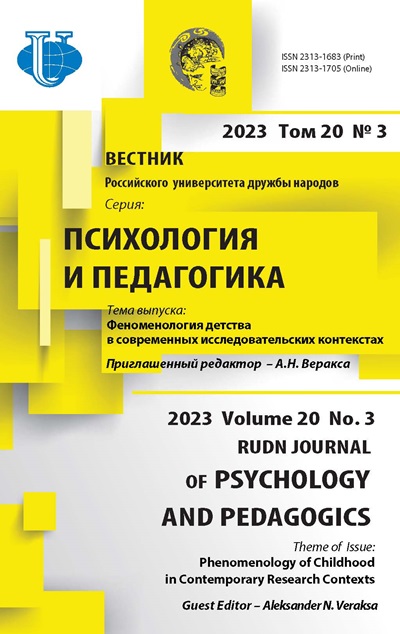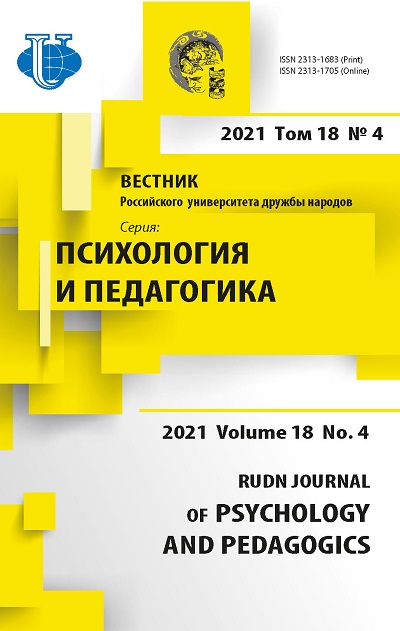Value and Life Meaning Aspects of the Moral Component of Spiritual Capacities: The Relationship in Russian Students Sample
- Authors: Ozhiganova G.V.1
-
Affiliations:
- Institute of Psychology of the Russian Academy of Sciences
- Issue: Vol 18, No 4 (2021)
- Pages: 849-868
- Section: PERSONALITY AND SOCIETY: PAST, PRESENT, AND FUTURE
- URL: https://journals.rudn.ru/psychology-pedagogics/article/view/29905
- DOI: https://doi.org/10.22363/2313-1683-2021-18-4-849-868
Cite item
Full Text
Abstract
The article is devoted to the axiological (value-meaning) sphere of Russian students. The author analyzes the definitions and concepts of values and meanings of life in domestic and foreign psychology, pointing out that many researchers note a close relationship between these constructs. The value-meaning aspects of the personality are considered in the context of the study of spiritual capacities, i.e., their moral component. Among the subcomponents of the moral component of spiritual capacities, three blocks are identified: (1) motivational-axiological - value-meaning (spiritual and moral qualities, striving for meaning); (2) affective-motivational - selfless love (spiritual altruistic orientation, empathy); and (3) cognitive-affective - conscience. This work is focused on the motivational-axiological block. The purpose of the study is to identify whether the value-meaning sphere, considered as part of the moral component of spiritual capacities, is balanced in modern student youth, which implies the consistency of the functioning of the spiritual and moral qualities (reflecting an orientation towards higher values), and the aspiration for meaning. The research objectives are to reveal the connections between the spiritual and moral qualities and the components of the value-meaning sphere (life-meaning orientations, value “Spiritual satisfaction”) among students; to establish the level of manifestation of these qualities in the studied sample; and to determine the differences in all the considered indicators between the male and female respondents. The sample was made up of 196 students (males = 73%; females = 27%; М = 19.76; SD = 1.556). The following inventories were used: The Spiritual Personality Inventory (SPI) by A. Husain, M. Anas (adapted by G.V. Ozhiganova); The Life Meaning Orientation Test (LMOT) by D.A. Leontiev; the scale of “Spiritual satisfaction” of the Axiological Orientation of a Personality 4.5 (AOP4.5) test by A.V. Kaptsov. The results of the study confirmed the hypothesis: on the sample of students, a significant positive relationship was established between the spiritual and moral qualities, reflecting the orientation of a person towards higher values, with aspirations for meaning and spiritual satisfaction. Gender differences were revealed only on the scale of “Spiritual satisfaction” - it was higher in girls. In the student sample, an average level of manifestation of spiritual and moral qualities was established.
About the authors
Galina V. Ozhiganova
Institute of Psychology of the Russian Academy of Sciences
Author for correspondence.
Email: symposium2016@rambler.ru
ORCID iD: 0000-0001-6339-8640
PhD in Psychology, is Leading Researcher at the Laboratory of Psychology of Abilities and Mental Resources named after V.N. Druzhinin
13 Yaroslavskaya St, Moscow, 129366, Russian FederationReferences
- Ayranci, E., & Ayranci, A.E. (2015). A research on the relationship between top managers’ intelligence and their ideas about business process reengineering: Consideration of emotionality and spirituality. International Business Research, 8(10), 66–80. http://dx.doi.org/10.5539/ibr.v8n10p66
- Bharti, B.К., & Verma, K.К. (2018). Qualities of a spiritual person and spiritual living. Indian Journal of Positive Psychology, 1(9). http://doi.org/10.15614/ijpp.v9i01.11754
- Bratus, B.S. (1988). Anomalii lichnosti. Moscow: Ideya Publ. (In Russ.)
- Bubnova, S.S., & Sytin, A.N. (2006). Tsennostnye oriyentatsii molodezhi razlichnykh regionov Rossii: Printsipy, metody, rezultaty issledovaniya. Obraz Rossiyskoy Psikhologii v Regionakh Strany i Mire: Conference Proceedings. Moscow: Institute of Psychology RAS Publ. (In Russ.) Retrieved May 24, 2021, from http://www.ipras.ru/cntnt/rus/dop_dokume/mezhdunaro/nauchnye_m/razdel_3_a/bubnova_ss.html
- Chudnovskiy, V.E. (1995). Smysl zhizni: Problema otnositelnoy emansipirovannosti ot vneshnego i vnutrennego. Psikhologicheskiy Zhurnal, 2(16), 15–26. (In Russ.)
- Frankl, V. (1990). Man in search of meaning. Moscow: Progress Publ. (In Russ.)
- Grachev, A.A. (1999). Zhiznennyye oriyentatsii kak determinanty zhiznedeyatelnosti. In L.A. Korostyleva (Ed.), Psikhologicheskiye Problemy Samorealizatsii Lichnosti (pp. 26–36). St. Petersburg: St. Petersburg State University Publ. (In Russ.)
- Grachev, A.A. (2008). Organizational environment as a condition for the realization of an employee’s life orientations. Psikhologicheskiy Zhurnal, (6), 27–38. (In Russ.)
- Hosseini, M., & Marei, S.P. (2017). Relationship between spiritual intelligence and spiritual leadership with the performance of directors of Bank of Tehran and the effect of spirituality mediation in the workplace. Journal of Accounting and Management, 3(1), 41–51. http://doi.org/10.21634/SJAM.3.1.4151
- Kalugin, A.Y. (2015). Tsennostnaya napravlennost lichnosti kak vyrazheniye smysloobrazuyushchey aktivnosti: Struktura, dinamika i funktsii v strukture integral'noy individual'nosti (na materiale studenchestva). Ph.D. in Psychology Thesis. Yekaterinburg.
- Kaptsov, A.V. (2015). Psikhologicheskaya aksiometriya lichnosti i gruppy: Metodicheskoye posobiye. Samara: SamLyuksPrint Publ. (In Russ.)
- Koessel, K.C. (2011). The relationship between spirituality and personality. Dissertations. Retrieved August 5, 2021, from https://scholarworks.wmich.edu/dissertations/430
- Leontiev, D.A. (2000). Vnutrenniy mir lichnosti. Psikhologiya Lichnosti v Trudakh Otechestvennykh Psikhologov (pp. 372–377). St. Petersburg: Piter Publ. (In Russ.)
- Leontiev, D.A. (2006). Test smyslozhiznennykh oriyentatsiy (SZHO). Moscow: Smysl Publ. (In Russ.)
- Malik, M.S., & Tariq, S. (2016). Impact of spiritual intelligence on organizational performance. International Review of Management and Marketing, 6(2), 289–297.
- Maslow, A. (2002). The farther reaches of human nature. St. Petersburg: Eurasia Publ. (In Russ.)
- Okpalaenwe, Е. (2016). Spirituality of psychology. Project: Inclusive education for all. http://doi.org/10.13140/RG.2.1.1720.0881
- Ozer, D.J., & Benet-Martinez, V. (2006). Personality and the prediction of consequential outcomes. Annual Review of Psychology, 57, 401–421.
- Ozhiganova, G.V. (2016). Dukhovnyye sposobnosti kak resurs zhiznedeyatelnosti. Moscow: Institute of Psychology RAS Publ. (In Russ.)
- Ozhiganova, G.V. (2019). Adaptation of spiritual personality inventory on the Russian sample. Experimental Psychology (Russia), 12(4), 160–176. (In Russ.) http://doi.org/10.17759/exppsy.2019120413
- Ozhiganova, G.V. (2020). Dukhovnaya lichnost'. Moscow: Institute of Psychology RAS Publ. (In Russ.)
- Rani, A.A., Abidin, M., & Ab Hamid, M.R. (2013). The impact of spiritual intelligence on work performance: Case studies in government hospitals of east coast of Malaysia. The Macrotheme Review, 2(3), 46–59.
- Rokeach, M. (1973). The nature of human values. NY: Free Press.
- Schwartz, S.H. (1992). Universals in the content and structure of values: Theory and empirical tests in 20 countries. In M. Zanna (Ed.), Advances in Experimental Social Psychology, 25, 1–65. http://dx.doi.org/10.1016/S0065-2601(08)60281-6
- Schwartz, S.H., Butenko, T.P., Sedova, D.S., & Lipatova, A.S. (2012). Refined theory of basic individual values: Application in Russia. Psychology. Journal of the Higher School of Economics, 1(9), 43–70. (In Russ.)
- Semyonov, V.Y. (1997). Typology of Russian mentality and immanent ideology of Russia. Bulletin of St. Petersburg State University, 6(4), 59–67. (In Russ.)
- Semyonov, V.Y. (2015). Sovremennaya Rossiya v kontekste kontseptsii rossiyskoy polementalnosti. In V.A. Koltsova & Y.V. Kharitonova (Eds.), Istoriogenez i sovremennoye sostoyaniye rossiyskogo mentaliteta (pp. 403–429). Moscow: Institute of Psychology RAS Publ. (In Russ.)
- Seryy, A.V., Yanitsky, M.S., & Kharchenko, Y.V. (2014). Valuable and semantic aspects of psychological work with the student's youth which is in the crisis situation. Novosibirsk State Pedagogical University Bulletin, 4(2), 40–48. (In Russ.) http://doi.org/10.15293/2226-3365.1402.04
- Serzhantov, V.F. (1990). Chelovek, yego priroda i smysl bytiya. Leningrad: Leningrad State University Publ. (In Russ.)
- Shreiber, T.V. (2006). Determinanty smysloobrazuyushchey aktivnosti lichnosti: Na materiale issledovaniya starshikh shkolnikov. Ph.D. in Psychology Thesis. Izhevsk. (In Russ.)
- Tuulik, К., Õunapu, Т., Kuime, К., & Titov, Е. (2016). Rokeach’s instrumental and terminal values as descriptors of modern organisation values. International Journal of Organizational Leadership, 5, 151–161. http://doi.org/:10.33844/ijol.2016.60252
- Vasilyuk, F.Y. (1984). Psikhologiya perezhivaniya (analiz preodoleniya kriticheskikh situatsiy). Moscow: Moscow State University Publ. (In Russ.)
- Volochkov, A.A., & Yermolenko, Y.G. (2004). The value orientation of the personality as an expression of meaning-forming activity. Psikhologicheskiy Zhurnal, 25(2), 17–33. (In Russ.)
- Yanitskiy, M.S. (2000). Tsennostnyye oriyentatsii lichnosti kak dinamicheskaya sistema Kemerovo: Kuzbassvuzizdat Publ. (In Russ.)
- Yanitskiy, M.S., & Seryy, A. V. (2010). Diagnostika urovnya razvitiya tsennostno-smyslovoy sfery lichnosti. Novokuznetsk: Institut Povysheniya Kvalifikatsii Publ. (In Russ.)
- Znakov V.V. (2005). Psikhologiya ponimaniya: Problemy i perspektivy. Moscow: Institute of Psychology of RAS Publ. (In Russ.)
- Zohar, D., & Marshall, I. (2000). Spiritual intelligence: The ultimate intelligence. London: Bloomsbury Publishing.
















